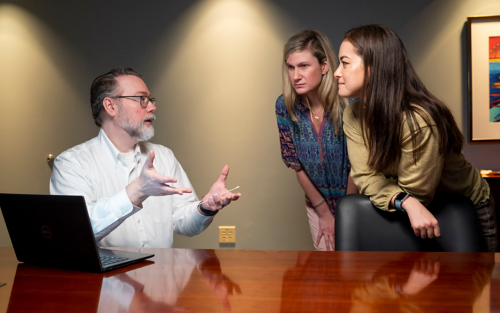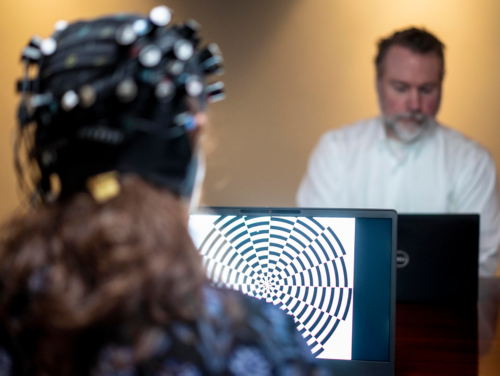Nicholas Phillips, MD, PhD
Research that leverages imaging, biologic and behavioral data to develop interventions to improve survivors’ health outcomes
Overview
Treatments for childhood cancer can cause an array of neurologic and neurocognitive challenges for survivors. Understanding and characterizing these problems is key to developing effective interventions that improve outcomes. My research leverages imaging, biologic and behavioral data to develop interventions that can improve survivors’ health outcomes.

Phillips research summary
As we try to predict health outcomes in survivors of childhood cancer, understanding how therapies affect neurologic and neurocognitive function is vital. My research within the Department Psychology and Biobehavioral Sciences uses imaging, biologic and behavioral data to generate a range of models that estimate how therapies may alter the neurologic and neurocognitive outcomes in survivors. In a collaborative effort, my colleagues and I collect data on the incidence of both common and unusual late effects in survivors and validate this information in large cohorts of survivors—St. Jude LIFE and the Childhood Cancer Survivor Study (CCSS). Our goal is to develop interventions that improve health outcomes.
In our characterization research, we examine the physical performance of survivors, specifically in regard to how their health performance impacts their neurologic and neurocognitive outcomes. Although it is generally understood that physical exercise has a positive impact on mobility, cognition, and reduces the risk of dementia and chronic illnesses, it is important to explore how the benefits of exercise extend to cancer survivors. We investigate the potential benefit of exercise on cognition in survivors of acute lymphoblastic leukemia (ALL) and aim to expand this study to survivors of Hodgkin lymphoma and those who received therapy that targeted their cardiopulmonary system.
Another area of our characterization research explores multiple aspects of the body’s response to chemotherapy and other treatments. We examine cerebral spinal fluid (CSF) biomarker and proteomic changes in response to chemotherapy and the impact chronic neuroinflammation has on children receiving cancer treatments. An interesting element of this research involves neuroimaging studies to show the connection between CSF biomarkers and the resultant changes to white or gray matter in the brain as observed via magnetic resonance imaging (MRI).

In addition to this characterization work, we explore non-traditional interventions to improve the neurocognitive outcomes of long-term cancer survivors. Using evidence observed from our functional and structural connectivity research, we target regions of the brain that are maldeveloped because of cancer treatment and employ transcranial electrical stimulation to suppress overconnected parts of the brain’s network.
Other intervention research involves the use of photobiomodulation, or light therapy, to transmit a near-infrared light to improve mitochondrial function in the cortex of the brain.
All aspects of our work seek to advance our knowledge of how treatment affects neurological and neurocognitive outcomes, so we can develop interventions to improve overall quality of life for childhood cancer survivors.
Phillips selected publications
About Nicholas Phillips
Dr. Nicholas Phillips is an Assistant Member in the Department Psychology and Biobehavioral Sciences at St. Jude. In his research role, he examines neurotoxicity and longitudinal brain development in survivors of childhood cancer. He received both his PhD in biomedical engineering and his MD from the University of Tennessee Health Science Center. In recognition of his academic and research accomplishments, he’s received numerous awards, including the International Cognition and Cancer Task Force Young Investigator Award. Outside his research efforts at St. Jude, Phillips serves on the editorial board of several publications as an ad-hoc reviewer and mentors students at institutions such as University of Tennessee Health Science Center, the University of Memphis and Rhodes College.

Contact Nicholas Phillips
Nicholas Phillips, MD, PhD
Assistant Member
Department of Epidemiology and Cancer Control
MS 735
St. Jude Children's Research Hospital
Memphis, TN, 38105-3678 USA
Follow Us

Memphis, TN, 38105-3678 USA GET DIRECTIONS